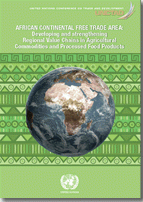
The African Union Assembly decided in 2012 during its 18th Ordinary Session to boost intra-African trade and to fast track the Continental Free Trade Area (CFTA). This CFTA is expected to boost intra-African trade expansion, stimulate sustained economic growth and foster inclusive development.
The CFTA is more than a free trade agreement. It is perceived as a platform that would facilitate a process of inclusive structural transformation of African countries, contributing to meeting Africa's 2063 Vision. In this process, the CFTA would also help Africa to make progress in implementing the 2030 Agenda and Sustainable Development Goals.
The present study aims to enhance knowledge among policy-makers, experts and private sector on requisite policies and measures for fostering the development and strengthening of regional supply and value chains in agricultural commodities and processed food products. This would contribute to the development of intra-African trade in agricultural and food products including through the setting up and strengthening of regional agro-food supply chains.
The report aims at presenting key modalities for fostering or adding value in regional supply chains in agricultural commodities and processed food products, in relation to helping to establish the CFTA and boosting intra-African trade. The target audience is African policy-makers, experts of the African Union Commission, the regional economic communities and AU member States.
It is intended to propose guidelines on establishing regional value chains in agricultural commodities and processed food products.
The focus of this report is as follows:
-
To provide a literature review on the many methodologies on value chain analysis and development, particularly in the sector of agri-food products and in the African region, recapping the definitions of the concepts used in the value chain paradigm (Chapter 1)
-
To give an overview of the regional agriculture value chains of specific commodities existing at the regional level, including mapping, presentation of actors and focus on special issues such as trade barriers (Chapter 2)
-
To suggest methods for prioritization of regional agricultural value chains to be further developed, and to test this approach with the analysis of two priority commodities, the potential development of regional value chains in these sectors, with a view on value addition (Chapter 3)
-
To draw conclusions and policy recommendations for fostering and establishing regional value chains in agricultural commodities and processed food products in Africa (Conclusion chapter).
The report is based on analysis of existing documentation (including books, reports, best practices, etc.) and consultation of trade databases.
The study was made out of secondary data review. No “fresh” data – e.g. through interviews of stakeholders – was collected for this assignment. Furthermore, the fixed length of the report (forty pages plus annexes) contained the scope.
The study cannot be considered as an exhaustive value chain analysis of determined agricultural sectors in Africa. It is aimed at examining the concept of regional value chains, applied to agricultural commodities in Africa, for policy-makers willing to quickly grasp the issues at stake and to understand the main features of value chain prioritization.


